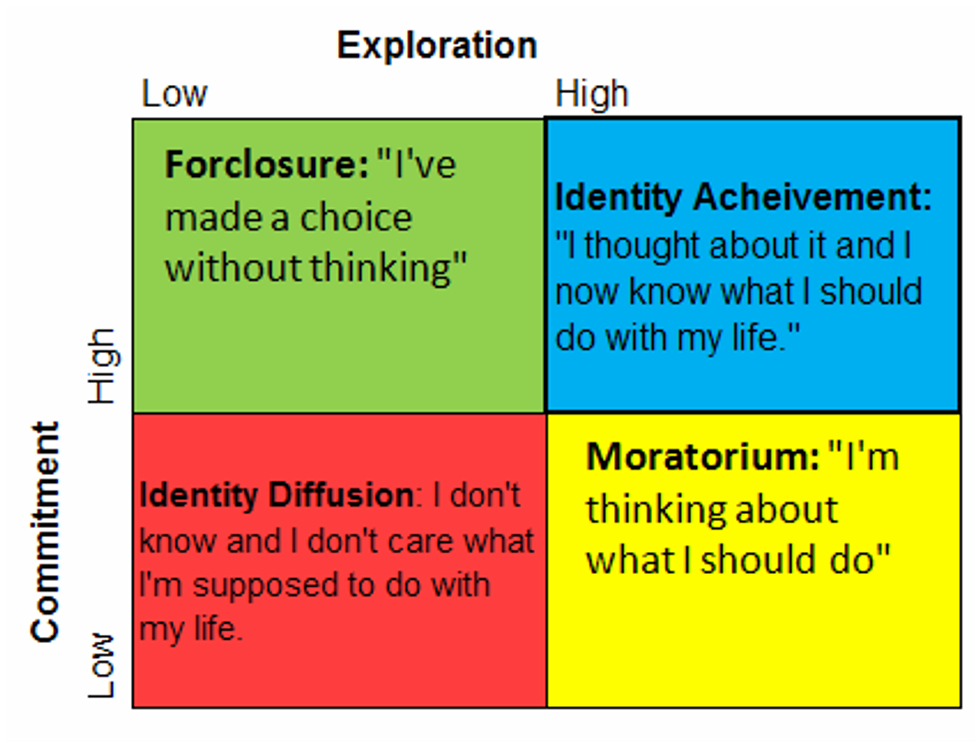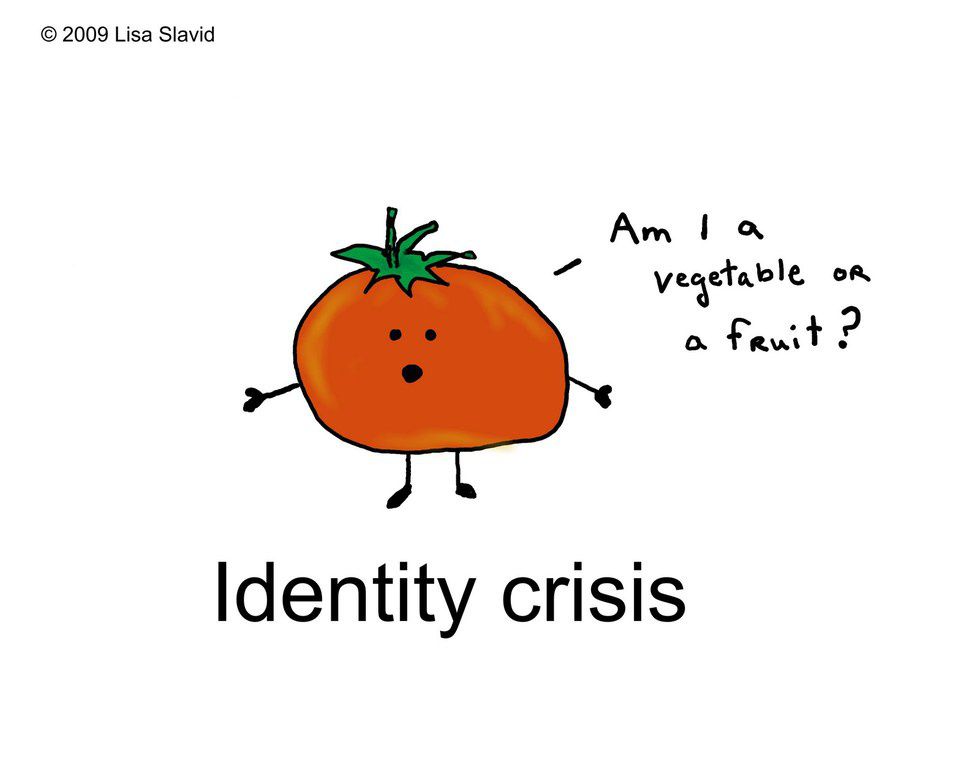A middle-aged man dyes his grey hair darker to make him look younger. Maybe then he buys a sports car or a motorcycle and even quits his job. Then, he goes skydiving or bungee jumping and buys a whole new wardrobe to go with his "new life".
What does this all sound like to you? A mid-life crisis perhaps? A mid-life crisis is a common stage of life portrayed in a variety of film and televisions programs. What I described above is an accurate depiction of what one may picture when asked to explain what a mid-life crisis looks like. This idea is one that is common and frequently discussed. However, there is a new stage of life that is emerging on the world stage:
The much dreaded quarter-life crisis
In the late to mid 1990's, the psychologist James Marcia created something known as the "Identity Status Theory". In this theory, Marcia depicts the stages and events that lead to the creation of what one could consider to be their "identity", or in other words, who they are as a person. There are four stages that people encounter in establishing their identity:
Identity Diffusion: The state in which the adolescent does not have a sense of having choices; he or she has not yet made, or is attempting/willing to make, a commitment to an identity.
Foreclosure: The state in which the adolescent seems willing to commit to some relevant roles, values or goals for their fate. However, they have not experienced an identity crisis. They tend to conform to the expectations of others regarding their future.

Moratorium: The state in which the adolescent is currently in a crisis, exploring various commitments and is ready to make choices but has not yet made a commitment to the choices yet.
Identity Achievement: The state in which adolescent has gone through a identity crisis and has made a commitment to a sense of identity.
According to Marcia, everyone goes through these stages when coming into what is their present identity. However, you do not necessarily go in any particular order and you may not experience all stages. But these stages are how your identity eventually develops.
Children are constantly asked questions growing up like "What do you want to be when you are older?", "What is the kind of person you want to be when you are older?" and "What kind of person do you want to be remembered as?"
When I was very young, I would have said I wanted to be a 'dinosaur digger' (my 4-year old term for an archaeologist). I wanted to be like my parents and I wanted to remembered as being a funny person. When I reached middle school, I would have said I wanted to be an English teacher at the middle school level. I wanted to be a respected/intelligent person and I wanted to be remembered for being a good friend.
As I entered college, I wanted to be a high school history teacher. I wanted to be a hardworking and passionate person, and I want to be remembered for being a caring and loving person. Things have changed over time. As Marcia suggested, we are constantly coming into times of identity crisis where our identity is broken down, and reconstructed into something completely new or just re-amped from what it was before. But the thing is, more and more people are experiencing a serious identity crisis as they hit their early to mid 20's.
Where does this "Quarter-Life Crisis" emerge from?
In terms used by Marcia, young adults are expected to have already reached identity achievement when we enroll in college. We are expected to know who we are and what we want to do with the rest of our lives. College applications always ask for your intended major and sometimes even your intended occupation. Sometimes we do not know what we want to be or even who we want to be though. This expectation sends us into a state moratorium that is hard to get out off. It puts so much pressure on young adults to know who they are that it is difficult for them to find out. The pressure can even be considered to be paralyzing to the point where you cannot make a commitment to an identity.
On the other hand however, often times, young adults come into college in the state of foreclosure. They have been greatly affected by what their parents, teachers, or peers have told them to do or be. More so these days than ever helicopter parents have been emerging. They heavily involve themselves in their child's life so that their child has become a mere canvas on which the parents paint their own expectations. When the child grows up and attends college, they may have an idea of exactly what they are going to do thanks to their parents. However, the only constant thing in life is change.
My mom always tells me about how she entered into college ad as engineering major. Her father was a physics teacher and she felt as if that is what she needed to do. However, after one quarter of not getting the grades she wanted, she switched to accounting. She ended up benefiting very much from this major change in more ways than one. However, can you imagine entering in to college, never experiencing an identity crisis, with everything all figured out only to find that your intended path in life is actually wrong for you? It can be really traumatizing finding out that everything you previously believed was wrong. It extends the period of moratorium as you have no back up plan or had ever made any other considerations as to what to do with you life. It is an extremely stressful to be in.
So maybe this crisis comes from the societal pressure to have your life all together in order to be successful. Maybe it is developed from having to have your life all planned out before reaching college so you can graduate in four years. I mean college is expensive and you do not want to spend any more money than you absolutely have to. Maybe this crisis emerges from the feeling of being behind your peers if you are not sure what you want to do in life. Maybe it comes from the drastic changes between high school and college. The changes mostly being ones in your social and emotional spheres of life but possibly your academic sphere as well. College is often described as "the next step in you life" but quite honestly it is "the next leap in your life". A lot of things change. You leave behind friendships, your bedroom, you parents and other family members. It is all up to you to be a full-functioning adult as you try to find yourself among new social situations and peers. It is a big time for change.Quarter life crises might be kind of terrifying as you lie there on the floor questioning everything you know or when you look in the mirror and realize you do not even know if recognize the person staring back at you. But know this, you are not alone. So take it from me, a girl who in the last three weeks has gotten a tattoo and died my whole head to red from its original brown color. I've been there. We are all in this together and we will all develop into amazing adults who have their life all together. We do not need to be perfect right now as we are still growing and changing. Just love yourself for you.























